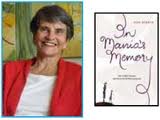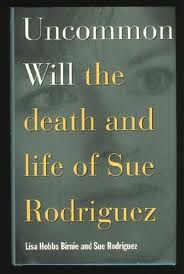Lisa Hobbs Birnie at SFU
September 07th, 2014

One of B.C.’s foremost journalist and authors, the largely under-heralded Lisa Hobbs Birnie, will give a public address at SFU Special Collections at the W.A.C. Bennett Library in Burnaby–on the SFU campus–on September 25, 2014
Lisa Hobbs Birnie’s career as a journalist began in her native Australia, soon followed by a move to the United States where she plied her trade in San Francisco for several years writing political columns and interviewing such luminaries as Lena Horne, Louis Armstrong, Claire Booth Luce, Joan Crawford, and Timothy Leary.
She was a delegate to the first America/Canadian Newspaper Guild National Conference on Woman’s Rights held in Chicago in 1970. Moving to Vancouver in the 1970s she wrote for the Vancouver Sun for eight years as a reporter/columnist. She was the first woman associate editor of the Sun.
MORE ON LISA HOBBS BIRNIE
 During her writing career spanning seven decades, Lisa Hobbs Birnie, a ground-breaking journalist, published ten books, most notably Uncommon Will: The Death and Life of Sue Rodriguez, to investigate the societal stigma of suicide and the need for right-to-die legislation in Canada.
During her writing career spanning seven decades, Lisa Hobbs Birnie, a ground-breaking journalist, published ten books, most notably Uncommon Will: The Death and Life of Sue Rodriguez, to investigate the societal stigma of suicide and the need for right-to-die legislation in Canada.
She has also taken on subjects that include the Canadian penal system, China, the Holocaust, feminism and murder. In Such a Good Boy, she wrote about how 18-year-old Darren Huenemann convinced two friends to kill his mother and grandmother in 1990 in order that he might sooner inherit their estate, while avoiding pat conclusions and sensationalism in the process.
 Some of Hobbs Birnie’s earlier books arise from her years as a foreign correspondent, such as India India (McGraw-Hill 1963) and I Saw Red China (McGraw-Hill 1966). Two autobiographical works pertaining to the emergence of feminism in the Seventies, Love and Liberation: Up Front with the Feminists (McGraw-Hill 1972) and Running Towards Life (McGraw-Hill 1973, describe how and why she left San Francisco to live in a remote cabin near the Alberni Canal in B.C.
Some of Hobbs Birnie’s earlier books arise from her years as a foreign correspondent, such as India India (McGraw-Hill 1963) and I Saw Red China (McGraw-Hill 1966). Two autobiographical works pertaining to the emergence of feminism in the Seventies, Love and Liberation: Up Front with the Feminists (McGraw-Hill 1972) and Running Towards Life (McGraw-Hill 1973, describe how and why she left San Francisco to live in a remote cabin near the Alberni Canal in B.C.
After breaking into the newspaper business in her native Australia, Hobbs Birnie was a delegate to the first American/Canadian Newspaper Guild National Conference on Women’s Rights, in Chicago, in 1970. Having worked for ten years in San Francisco as a reporter, she wrote for the Vancouver Sun for eight years as a reporter and columnist. She became the first woman associate editor of The Sun in 1976.
A former Contributing Editor to Saturday Night Magazine, Hobbs Birnie then worked as full-time member of National Parole Board for nine years, giving rise to Inside the Parole Board: The Truth About Canada’s Criminal Justice System (Macmillan 1990).
In 1994, Sue Rodriguez of Victoria was diagnosed as having Lou Gehrig’s disease, or ALS, an increasingly degenerative disease of the nerves and muscles. She died in February of 1994. Lisa Hobbs Birnie’s Uncommon Will: The Death and Life of Sue Rodriguez (Macmillan 1994) serves as a landmark volume in the ongoing struggles to establish the legal right to assisted suicide in North America, to enable loved ones to die with dignity.
Uncommon Will was followed by Western Lights: Fourteen Distinctive British Columbians (Raincoast, 1996), including profiles of Sven Robinson, L.R. Wright, Vicki Gabereau, Joy Kogawa and Nicola Cavendish.
 At age 82, Hobbs Birnie published her investigation of a remarkable Holocaust relationship, In Mania’s Memory (Read Leaf 2010), about a Polish Jew named Mania Fishel Kroll and a German Christian named Johanne Clausen Muller. After Mania was imprisoned in Auschwitz at age seven, she was protected, at age twelve, by her Nazi guard, Johanne, who gave her special food, enabling her to survive in a work camp called Reichenbach. More than thirty years later, Mania was living in Toronto in 1976 when she hired a cleaning woman who struck her as strangely familiar. Mania became convinced her cleaning lady was Johanne, the once beautiful, young German woman who had been passionately in love with an officer of the Third Reich. But this cleaning lady steadfastly denies she is Johanne. Are memories reliable? Birnie accompanied both women on a journey back to Auschwitz to unravel the truth.
At age 82, Hobbs Birnie published her investigation of a remarkable Holocaust relationship, In Mania’s Memory (Read Leaf 2010), about a Polish Jew named Mania Fishel Kroll and a German Christian named Johanne Clausen Muller. After Mania was imprisoned in Auschwitz at age seven, she was protected, at age twelve, by her Nazi guard, Johanne, who gave her special food, enabling her to survive in a work camp called Reichenbach. More than thirty years later, Mania was living in Toronto in 1976 when she hired a cleaning woman who struck her as strangely familiar. Mania became convinced her cleaning lady was Johanne, the once beautiful, young German woman who had been passionately in love with an officer of the Third Reich. But this cleaning lady steadfastly denies she is Johanne. Are memories reliable? Birnie accompanied both women on a journey back to Auschwitz to unravel the truth.
Lisa Hobbs Birnie is a recipient of a Professional Journalism Fellowship to Stanford University, a gold medal from the National Magazine Foundation (1992), the Hubert Evans Award for B.C. Non-Fiction, and she has served as a writer-in-residence at Monash University, Melbourne (1998). Her book on China received the Kajima Institute for Peace Award in Tokyo, in 1968, and she organized one of the first Christian-Buddhist Conferences in Canada, in Surrey, in 1998.
Along the way she has interviewed the likes of Lena Horne, Louis Armstrong, Woody Allen, Clare Boothe Luce, William Shatner, Joan Crawford, Burt Lancaster and Timothy Leary. She has met the likes of Mme. Kang Kai Check, King Juan Carlos and Queen Sophia of Spain, Hedda Hopper, Gregory Peck and Prince Sihanouk of Cambodia.
Near the outset of the 21st century, she married the artist John Koerner. Hobbs Birnie edited his memoirs for A Brush with Life (Ronsdale 2005). “There’s no such thing as retirement in writing or publishing,” she has said. Lisa Hobbs Birnie lives with her husband in a Kerrisdale apartment. Her papers are housed at Simon Fraser University Special Collections.


Lisa I still think of you and Jack often. You both meant so much to me. Oh, to go back!! Love you. Maria
I knew jack when he worked for Purity Stores, we discussed you and your writing for The Examiner. I thought your writings during those times was great. Is jack still alive???? You are still writing good luck to you. Allan A.
Hello Lisa, I am so pleased to find a way to reach you. I have something I would love to return to you. You can reach me at this posted email. Sincerely, Susan